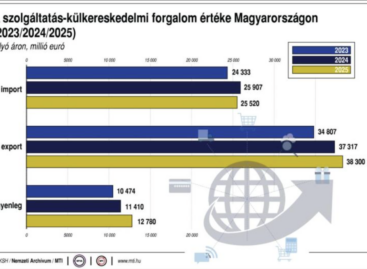GKI: Recession, accelerating inflation, dangerously deteriorating external balance
The GKI’s current forecast was prepared amid even greater uncertainty than usual, and the understanding of the trends is made difficult by the abrupt change in economic processes this year, in the middle of the year. GKI raised its growth forecast for 2022 from 3.7% to 4.5%, while for 2023 it no longer forecasts a growth of 2.7%, but a decline of around 3.5%. The revision is justified by the faster-than-expected growth in the second quarter of 2022, the spectacularly worsening balance, and the increasingly dangerous global political and economic situation, as well as the mid-year cuts that have already been made and are expected to affect 2023.

Recession continues to expand
In addition, the GKI assumes the continuation of the current external conditions, slow but at least partial access to EU transfers. While consumption may rise by 7.5% this year, a drop of 3.5-4% is expected next year, and investments may decrease by double digits after this year’s stagnation. After falling to 3.5% this year, unemployment will be slightly higher next year than in 2021, around 4.3%. GKI significantly raised its inflation forecast to 14.5% for this year and around 16% for next year; However, in the second half of 2023, inflation is already expected to drop rapidly to around 10%. The public budget deficit in proportion to GDP will be higher than currently planned, at 6.5, or around 5% next year, and the financing need in proportion to GDP is dangerously high, even with the beginning of EU transfers, at 5, or 3.5-4 next year will be %. This necessarily causes a threatening increase in foreign debt. The government interprets the EU’s rule of law requirements and the forced austerity as a technical issue, as a task that can be implemented within the framework of the state-centered Hungarian model, so for the time being no meaningful change is expected in either competitiveness or social policy.
Related news
MKIK seeks partnerships with businesses and government
🎧 Hallgasd a cikket: Lejátszás Szünet Folytatás Leállítás Nyelv: Auto…
Read more >Eurozone economic growth accelerated in February
🎧 Hallgasd a cikket: Lejátszás Szünet Folytatás Leállítás Nyelv: Auto…
Read more >KSH: The foreign trade surplus in services was 3.1 billion euros in the fourth quarter of last year
🎧 Hallgasd a cikket: Lejátszás Szünet Folytatás Leállítás Nyelv: Auto…
Read more >Related news
KSH: retail turnover in January exceeded the same period of the previous year by 3.5 percent and the previous month by 0.5 percent
🎧 Hallgasd a cikket: Lejátszás Szünet Folytatás Leállítás Nyelv: Auto…
Read more >A magyar csapat március 15-én lép színpadra a Bocuse d’Or Európai Válogatóján
🎧 Hallgasd a cikket: Lejátszás Szünet Folytatás Leállítás Nyelv: Auto…
Read more >REGIO Játék: 25.4 billion forints in sales and international opening
🎧 Hallgasd a cikket: Lejátszás Szünet Folytatás Leállítás Nyelv: Auto…
Read more >








